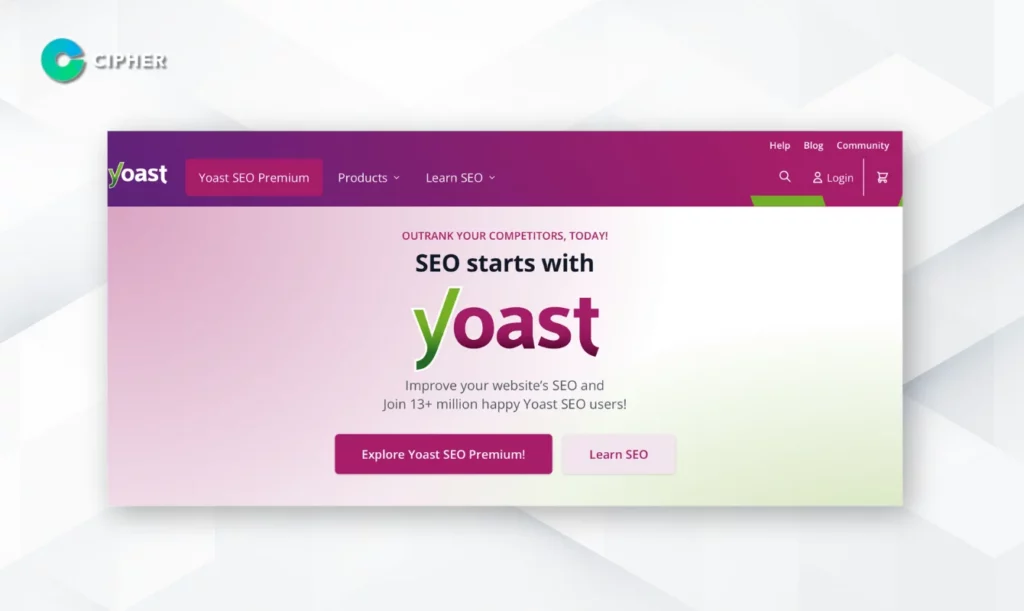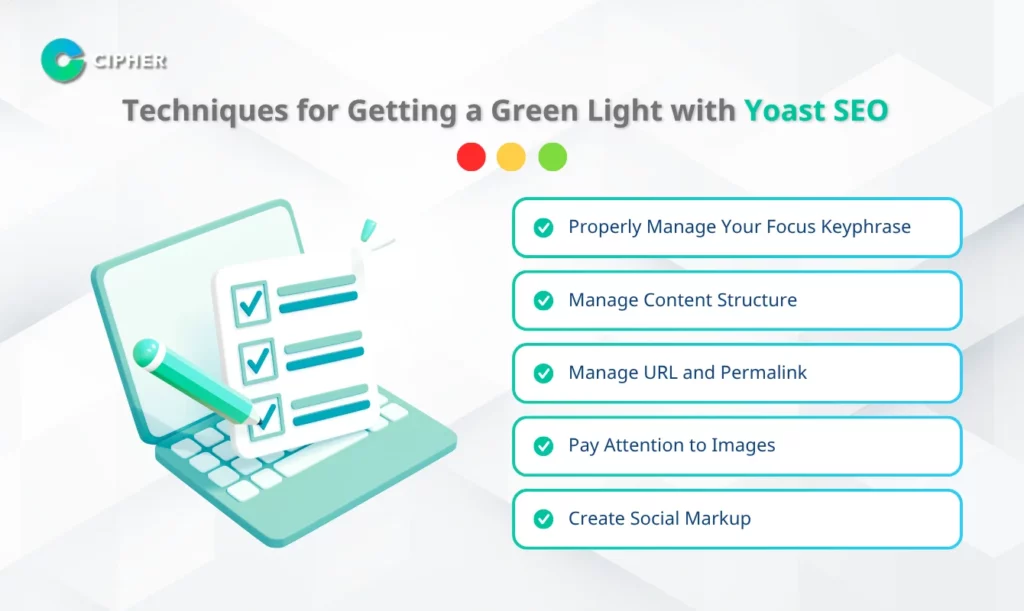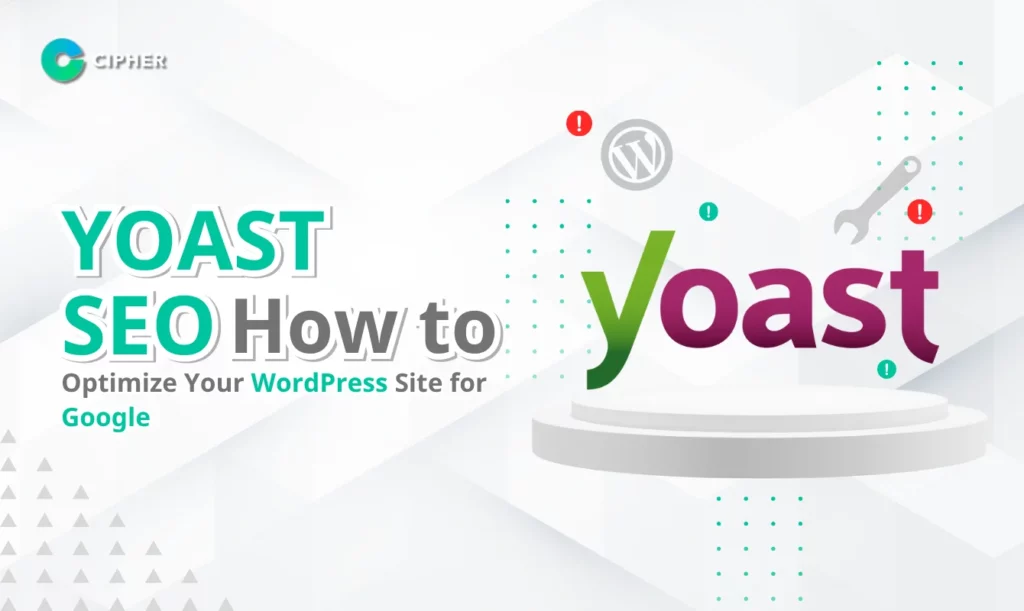Table of Contents
In today’s competitive digital landscape, getting your website to rank on Google isn’t easy. However, with the powerful Yoast SEO plugin, your optimization efforts can become significantly more manageable. This article introduces you to the Yoast SEO WordPress plugin used by over 5 million people worldwide, which helps create Google-friendly content and increases your chances of ranking higher. SEO WordPress is essential for all WordPress site owners who want to improve their online visibility.
What is Yoast SEO?

Yoast SEO is a comprehensive WordPress plugin that helps optimize your website to be more search engine friendly, particularly in terms of Technical SEO. While this plugin doesn’t guarantee instant first-page rankings, it effectively checks and adjusts your content structure according to proven SEO best practices.
SEO Yoast utilizes an intuitive traffic light system with three colors to indicate how SEO-friendly your content is:
- Green light = Excellent SEO structure
- Yellow light = Acceptable, but needs improvement
- Red light = Requires significant adjustments
The Yoast WordPress Plugin comes in both free and premium versions. The free version offers sufficient basic functions for general SEO work, while the premium version provides additional features for advanced users who need more sophisticated optimization tools. For more detailed information, you can visit the official Yoast website for comprehensive documentation.
Benefits of Using Yoast SEO
Yoast by SEO offers numerous advantages for website optimization:
- Optimizes web pages according to SEO principles – Provides recommendations for adjusting key elements including Title, Yoast Description, Keywords, images, and content structure.
- Increases ranking opportunities on search engines – Properly optimized websites have better chances of ranking than non-optimized ones.
- User-friendly interface for beginners – You don’t need extensive SEO knowledge because Yoast SEO WP features an intuitive guidance system with clear color indicators.
- Comprehensive features in the free version – The basic functions in Plugin Yoast SEO free version are sufficient for most general SEO requirements.
- Supports social media integration – Helps manage how your content appears when shared across various social platforms.
Additionally, Yoast SEO WordPress offers several technical functions including:
- Automatic XML Sitemap generation
- Creating Canonical URLs to solve duplicate content issues
- Generating robots.txt files
- Building Google Knowledge Graph (schema)
- Redirect function (Premium version only)
How to Install Yoast SEO
Installing Yoast SEO WP is straightforward and requires just a few steps:
- Log in to WordPress – Access your WordPress Dashboard
- Navigate to the “Plugins” menu – Click on “Plugins” in the left sidebar
- Select “Add New” – This will display the plugin search and installation page
- Search for “Yoast SEO” – Type “Yoast SEO” in the search box and press Enter
- Install and activate – Click on “Install Now” and wait for the installation to complete, then click “Activate”
That’s it! You’re now ready to use Plugin Yoast SEO. If you need help with installation or encounter any issues, our WordPress plugin services team can provide expert assistance.
How to Use Yoast SEO Effectively

1. Set Your Focus Keyphrase
The Focus Keyphrase is the word or phrase you want your page to rank for. Your Keyword Yoast selection should match user search intent and be relevant to your content. After entering your keyphrase, SEO Yoast will analyze it and provide improvement recommendations.
The free version allows you to set only one Focus Keyphrase. If you want to add more, you’ll need to upgrade to the Premium version.
2. Optimize Title and Meta Description
Title and Yoast Description are the first elements users see in search results, making them extremely important:
- SEO Title – Should be an appropriate length (neither too long nor too short) and should include your Focus Keyphrase near the beginning
- Meta Description – Should be compelling, include your Focus Keyphrase, and maintain an appropriate length
Yoast SEO provides a color bar indicating appropriate length – aim for a green bar.
3. Check Content Layout
The Yoast WordPress Plugin helps check if your content is easy to read through its Readability feature, which examines:
- Use of Heading Tags (H1-H6)
- Paragraph length (shouldn’t exceed 5 lines)
- Transition sentences
- Frequency of Passive Voice
Note: The Readability feature may not work perfectly with languages other than English, as it was primarily designed for English and other supported languages.
4. Check Links and Images
SEO Yoast checks your use of Internal Links and External Links, as well as image naming (Alt Text) to ensure they follow SEO principles:
- Include Internal Links to other pages on your website
- Include External Links to credible sources
- Images should have Alt Text that includes your Focus Keyphrase
5. Preview How It Will Appear on Google
Techniques for Getting a Green Light with Yoast SEO
1. Properly Manage Your Focus Keyphrase
- Place it in the first sentence – Include your Focus Keyphrase in the first paragraph of your article to help Google understand your content immediately
- Maintain appropriate density – Keyword Density shouldn’t exceed 2.5% of your total content
- Include in H2 or H3 headings – Your Focus Keyphrase should also appear in article subheadings
2. Manage Content Structure
- Ensure appropriate length – Content should be at least 300 words (for English)
- Create easy-to-read layout – Each paragraph shouldn’t exceed 5 lines, and you should use line breaks for better readability
- Utilize diverse formats – Such as bullet points, bold text, and italics to make the content more engaging
3. Manage URL and Permalink
- Create short and concise URLs – Should include your Focus Keyphrase and remove unnecessary articles (a, an, the)
- Use hyphens (-) instead of spaces – For example, “yoast-seo-guide” instead of “yoast seo guide”
4. Pay Attention to Images
- Include supporting images – Articles should have at least one image
- Name files appropriately – For example, “yoast-seo-guide.jpg” instead of “IMG12345.jpg”
- Add descriptive Alt Text – At least one image should have Alt Text that includes your Focus Keyphrase
5. Create Social Markup
Yoast SEO features tools to control how your content appears when shared on social media:
- Set titles and descriptions for Facebook and Twitter
- Define a cover image for sharing (recommended size is 1200×630 pixels)
Limitations of Yoast SEO for Non-English Languages
For non-English content, Yoast SEO WP has some limitations to be aware of:
- Cannot check non-English language structure with 100% accuracy – Since it was primarily designed for English and other supported languages
- Word count may be inaccurate – For some languages, the word count may differ significantly from English
- The Readability feature may not work perfectly – Sometimes it may suggest spacing that doesn’t follow non-English language rules
Despite these limitations, you can still use Plugin Yoast SEO effectively by not focusing too much on getting a green light, but using it as a guideline for improving your content.
14 Yoast SEO Checklist Items You Should Know
Understanding the various indicators in Yoast SEO WordPress will help you use it more effectively. Here’s a checklist of what you should know:
- Outbound Links – External links in your article, should have at least one link
- Image Keyphrase – Keywords in the Alt Text of your images
- Images – Images in your article, should have at least one image
- Internal Links – Links to other pages on your website, should have at least one link
- Keyphrase in Introduction – Including your keyphrase in the first paragraph, ideally in the first sentence
- Keyphrase in SEO Title – Including your keyphrase in the SEO title, preferably near the beginning
- Keyphrase length – The length of your keyphrase, shouldn’t be too long or too short
- Keyphrase Density – The frequency of your keyphrase in the article, shouldn’t exceed 2.5%
- Keyphrase in Meta Description – Including your keyphrase in the Meta Description
- Meta Description length – The length of your Meta Description, should be appropriate
- Previously Used Keyphrase – Checking if you’ve used this keyphrase in other articles
- SEO Title Width – The length of your SEO title, should be appropriate
- Text Length – The length of your content, should be at least 300 words (English)
- Keyphrase in Subheading – Including your keyphrase in subheadings (H2, H3)
Yoast SEO Optimization Services from Cipher
Our services include:
- Checking and configuring Yoast SEO Settings – We’ll set up Yoast SEO WP appropriately for your website, including General Settings, Search Appearance, and Social Media
- Analyzing and optimizing content for green lights – Our expert team will analyze and optimize your content according to WordPress SEO principles to get green lights from Yoast SEO
- Solving Technical SEO issues – We’ll check and fix technical problems that may affect your website’s ranking, such as Duplicate Content, Canonicalization, and XML Sitemap issues
- Planning Keyword strategy – Our team will analyze and plan a Keyword Yoast strategy suitable for your business
- Training on using Yoast SEO – We can provide training for your team to understand how to use Plugin Yoast SEO effectively
Why choose Yoast SEO Optimization services from Cipher?
- Experience – We have extensive experience in SEO and using Yoast SEO WordPress
- Measurable results – We focus on clear and measurable outcomes
- Comprehensive care – Not just optimizing Yoast WordPress Plugin but also handling other related Digital Marketing aspects
- Expert team – Our team consists of SEO and Digital Marketing specialists
Interested in Yoast SEO Optimization services from Cipher? Contact us at www.cipher.co.th – we’re happy to provide free consultation to help improve your website’s ranking.
Summary
Frequently Asked Questions
What is Yoast SEO plugin used for?
What should SEO beginners do?
To get your website on the first page of Google, SEO beginners should follow these steps:
- Analyze and clearly define your target audience and plan the content to focus on
- Conduct Keyword Research and plan keyword usage systematically across the website
- Design a website structure (Site Structure) that is user-friendly and search engine-friendly, with planned content sequence
- Create high-quality content that meets target audience needs and matches your keywords
- Improve the user experience (Website UX) to be easy to use, fast-loading, and mobile-friendly





